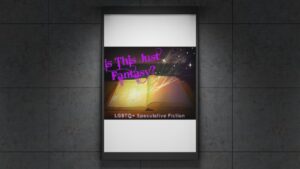For generations, fantasy literature has offered readers a doorway into distant realms—worlds filled with dragons, magic, ancient prophecies, and impossible quests. Traditionally, fantasy has been seen as a form of escapism, a genre that whisks us away from the mundane realities of life and immerses us in the extraordinary. However, behind the magic and mythical landscapes, fantasy has always had the potential to do something more profound: to mirror the world we live in and the struggles we face.
In recent years, a growing wave of LGBTQIA+ authors has begun to reshape the fantasy genre in powerful ways. With fresh narratives, inclusive worldbuilding, and deeply personal storytelling, these writers are using fantasy not just to imagine what could be, but to examine what is. They bring to the forefront themes of identity, marginalization, resistance, and belonging—reflecting the real-world experiences of queer communities through speculative lenses.
This article explores how LGBTQIA+ authors are turning fantasy into a mirror, revealing hard truths and offering radical reimaginings. Far from being just an escape, their stories serve as both a reflection of real-world struggles and a hopeful redefinition of what our worlds—both fictional and real—can become.
Why Fantasy? The Genre’s Unique Power
Fantasy holds a unique position among literary genres due to its metaphorical and allegorical strengths. Unlike strictly realistic fiction, fantasy creates entirely new worlds governed by their own rules, magic systems, and societies. This freedom allows authors to explore complex themes—such as identity, oppression, and transformation—in ways that resonate on multiple levels without being constrained by real-world limitations.
The metaphorical nature of fantasy means that struggles faced by characters often symbolize larger social and political issues. For LGBTQIA+ authors, this offers a powerful tool: the ability to represent queer experiences through magical elements, mythical creatures, or fantastical conflicts. For example, shapeshifting may symbolize fluid gender identity, while oppressive regimes in a fantasy world can reflect the systemic discrimination queer people face in reality.
Additionally, fantasy allows for safe exploration of difficult topics. Readers and writers alike can engage with sensitive issues such as marginalization, trauma, or self-discovery at a symbolic distance, which can be both illuminating and healing. The imaginative space encourages empathy and understanding without the immediate defenses that real-world discussions sometimes provoke.
Worldbuilding—the creation of detailed, immersive settings—is another key strength. It not only grounds stories in believable contexts but also enables critique and hope to coexist. Authors can depict flawed societies that mirror real-world injustices while simultaneously envisioning alternatives: worlds where diversity is celebrated, and queer identities thrive without fear. This dual capacity makes fantasy an ideal genre for LGBTQIA+ authors to reflect real-world struggles and imagine transformative possibilities for the future.
Common Real-World Themes Reflected by LGBTQIA+ Authors
LGBTQIA+ authors use fantasy to reflect real-world struggles through several recurring themes. These themes not only highlight queer experiences but also deepen the genre’s emotional and social resonance.
Identity and Transformation
One of the most prevalent themes is identity and transformation. Fantasy’s magical elements often serve as metaphors for the fluidity and complexity of gender and sexual identities. Magical metamorphosis—such as shapeshifting, body magic, or characters with dual identities—parallels the experiences of many LGBTQIA+ individuals exploring and affirming their true selves. For instance, characters who physically transform may symbolize gender transition or the discovery of hidden aspects of identity. Authors use these devices to dramatize the journey of self-acceptance and the challenges of existing outside societal norms.
Oppression and Resistance
Oppression and resistance are central themes in many queer fantasy narratives. Fantasy worlds frequently feature empires, tyrants, or restrictive magical laws that symbolize real-world systems of discrimination and marginalization faced by LGBTQIA+ communities. These oppressive structures provide a backdrop for stories of rebellion, resilience, and activism. The fight against unjust rulers or laws mirrors queer resistance movements, emphasizing themes of courage, solidarity, and the demand for justice. This allegorical approach allows authors to critique real-world inequalities in a way that is both compelling and accessible.
Chosen Family and Belonging
The theme of chosen family is especially significant in queer fantasy. Many LGBTQIA+ characters experience rejection or alienation from their biological families, making the creation of “found families” a powerful healing narrative. Fantasy often celebrates these chosen bonds—groups of characters who support and protect one another against hostile environments. These found families provide safe spaces where queer characters can belong, thrive, and build meaningful connections. Such portrayals challenge traditional family models and highlight the importance of community and acceptance.
Hope and Utopian Reimagining
Finally, LGBTQIA+ fantasy frequently offers visions of hope and utopian reimagining. These stories imagine worlds where diversity is embraced, queer identities flourish without fear, and social justice is realized. Far from merely reflecting hardship, such fantasies provide blueprints for better, more inclusive societies. They emphasize queer joy, love, and thriving as radical acts of resistance in themselves. Through these hopeful narratives, authors inspire readers to envision and work toward a more equitable future, both within and beyond the pages of their books.
Recommended Titles by LGBTQIA+ Authors
To better understand how LGBTQIA+ authors use fantasy to reflect real-world struggles, here is a curated list of essential titles. Each book offers unique perspectives on queer experiences through imaginative storytelling and thematic depth.
The Priory of the Orange Tree by Samantha Shannon This epic fantasy centers on a matriarchal society threatened by dragons and political intrigue. The novel features multiple queer protagonists and explores themes of power, identity, and love. It reflects real-world issues of patriarchy, gender diversity, and the fight for acceptance in traditionally rigid societies.
The Black Tides of Heaven by Neon Yang Set in a world where magic and politics intertwine, this novella follows twins who diverge in their paths of self-discovery and rebellion. The story addresses gender fluidity and authoritarian oppression, mirroring struggles around gender identity and resistance to oppressive regimes.
Gideon the Ninth by Tamsyn Muir Combining necromancy with space opera, this novel follows Gideon, a queer swordswoman navigating deadly politics and dark secrets. It explores themes of found family, trauma, and survival, highlighting the complexity of queer identities in hostile environments.
The Long Way to a Small, Angry Planet by Becky Chambers Though more science fiction than fantasy, this novel is celebrated for its inclusive representation, featuring several LGBTQIA+ characters. It promotes themes of belonging, acceptance, and the creation of chosen families in diverse, multicultural settings.
An Unkindness of Ghosts by Rivers Solomon This sci-fi fantasy depicts a segregated spaceship society reflecting racial and queer oppression. The protagonist’s journey tackles trauma, identity, and resistance, paralleling the real-world intersections of race, gender, and sexuality.
The Song of the Jade Lily by Kirsty Manning Blending historical fantasy with a focus on identity and family secrets, this novel explores queer love and resilience amid war and social upheaval. It reflects themes of survival, cultural identity, and the importance of chosen families.
The Tensorate Series by Neon Yang This series is notable for its nonbinary protagonists and intricate worldbuilding. It tackles themes of gender identity, rebellion against authoritarian rule, and the search for personal and political freedom, offering nuanced reflections on queer existence.
These books exemplify how LGBTQIA+ authors use fantasy not just to entertain but to challenge norms, foster empathy, and inspire readers to rethink identity, justice, and community.
Why These Stories Matter
The stories told by LGBTQIA+ authors in the fantasy genre hold significant importance for both literature and society. One of the most powerful effects of these narratives is the role of representation. When readers see characters who reflect their own identities, experiences, and struggles, it fosters a sense of validation and belonging. For queer readers, this representation can be life-changing—offering hope, comfort, and inspiration in worlds that often exclude them. For non-queer readers, these stories provide a window into experiences different from their own, helping to build empathy, reduce prejudice, and promote understanding.
Moreover, queer voices are vital in reshaping the fantasy genre itself. Traditionally, fantasy has been dominated by heteronormative and often exclusionary narratives. LGBTQIA+ authors challenge these norms by introducing diverse perspectives, dismantling stereotypes, and expanding the boundaries of what fantasy can explore. Their work enriches the genre, making it more inclusive and reflective of the real world’s complexity.
The impact of these stories extends beyond identity politics. They encourage all readers to question societal structures, embrace difference, and imagine alternative futures. Through the power of storytelling, queer fantasy fosters community, healing, and transformation—making it a crucial part of contemporary literature and culture for everyone.
How to Start Reading More Queer Fantasy
If you’re interested in exploring more queer fantasy literature, there are effective ways to discover LGBTQIA+ authors and immerse yourself in diverse, meaningful stories.
Tips for Discovering LGBTQIA+ Authors Start by seeking out lists and recommendations curated specifically for queer fantasy readers. Many online book communities and websites regularly update reading lists featuring LGBTQIA+ authors. Following authors on social media platforms is also a great way to stay informed about their latest works and related discussions. Additionally, pay attention to book awards and recognitions focused on queer literature, such as the Lambda Literary Awards or the Otherwise Award.
Resources: Indie Publishers, Queer Book Clubs, and Online Communities Independent publishers often champion diverse voices that mainstream publishing might overlook. Imprints like Tor.com, Small Beer Press, and Lethe Press frequently publish queer speculative fiction. Joining queer book clubs—many of which operate online on platforms like Goodreads, Discord, or Reddit—can provide both recommendations and a supportive space for discussion. Online communities dedicated to LGBTQIA+ literature, such as Tumblr fandoms or Twitter hashtag groups (#QueerFantasy, #OwnVoices), are excellent for discovering new titles and connecting with fellow readers.
Encouragement to Read Widely and Reflect Deeply Approach queer fantasy with an open mind and a willingness to engage deeply with its themes. Reading broadly across different subgenres and authors helps build a richer understanding of the diversity within queer experiences. Reflecting on the stories’ parallels with real-world struggles can deepen empathy and insight. Above all, enjoy the journey—these stories are not only powerful mirrors but also sources of joy, imagination, and hope.
By actively seeking out queer fantasy, readers contribute to a growing movement that amplifies marginalized voices and expands the horizons of the genre for everyone.
Conclusion
Fantasy, especially when written by LGBTQIA+ authors, serves as both a mirror and a map. It reflects the real-world struggles of identity, oppression, and resilience faced by queer communities, while also charting hopeful pathways toward inclusion, belonging, and transformation. These stories allow readers to see themselves represented authentically and to envision worlds where justice and joy are possible.
The transformative power of storytelling lies in its ability to foster empathy, challenge assumptions, and inspire change. Queer fantasy enriches the genre by expanding its emotional and social reach, offering narratives that are as meaningful as they are imaginative. As readers engage with these works, they participate in a larger cultural conversation about identity, acceptance, and the future we want to create.
In embracing queer fantasy, we not only gain access to compelling stories but also contribute to a more diverse and inclusive literary landscape—one where every reader can find both refuge and inspiration.




